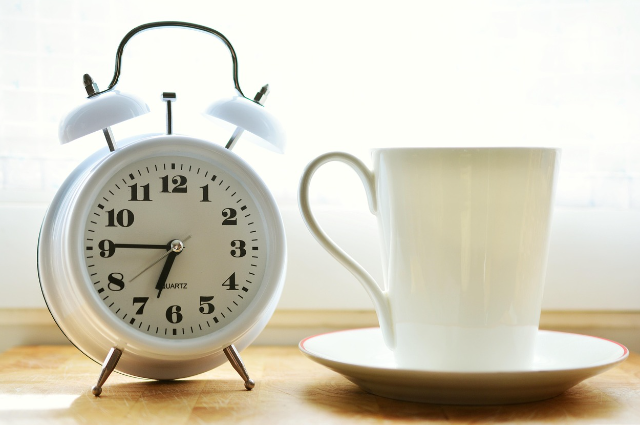
Is it simply a habit of those who are ambitious, or does science back up what spiritual teachings have long suggested—that the early hours of the morning possess a special kind of energy?
There's a lot of buzz surrounding the idea of rising at 4 a.m., as if the hour itself carries some enchantment. But the reality is, the real magic comes from within you. Waking up at 4 a.m. just to imitate someone else's routine or chase after success means nothing if it lacks purpose. The true reason for embracing that early hour should be to savor the tranquility, to delight in the solitude before the world awakens, to breathe in the crisp morning air, and to appreciate the glistening dew on the leaves.
The Circadian Rhythm
Our bodies follow a rhythm that feels less like a ticking clock and more like the rise and flow of nature, shaped by the gentle shifts between day and night, the release of hormones, and the balance of work and rest. This enchanting cycle, known as the circadian rhythm, spans a full 24 hours and influences everything we do—our sleep, body temperature, digestion, hormonal secretions, and our very emotions. Our body's internal clock, situated in the hypothalamus, harmonizes our natural flow with the world around us.
Hormones:
Our body's internal clock, known as the circadian rhythm, gets in tune with hormones. Each hormone contributes to our daily rhythm, affected by light, interactions, activity, and our emotional ups and downs. Among these essential players are:
Melatonin: This sleep-inducing hormone, released by the pineal gland, sets the stage for sleeping. Its highest levels typically rise between 2 and 4 a.m.
Cortisol: This hormone acts as our body’s alertness signal and a source of energy. It follows a distinct circadian rhythm, peaking between 4 and 6 in the morning. This spike is part of what's called the cortisol awakening response—nature’s alarm clock gently waking us into the new day.
Serotonin: Think of it as your brain's cheerleader! This hormone helps keep your mood in check, promoting feelings of happiness and emotional harmony. It gets a boost from sunshine and staying active.
Dopamine: This fascinating neurotransmitter plays a key role in our sense of reward and focus. As the sun begins to rise each morning, our dopamine levels start to climb, especially when we soak up some of that glorious natural light right from the sun.
Growth hormones play a vital role in our development and the healing of our cells, and their activities take place predominantly while we're in the depths of a deep slumber.
Cortisol
Cortisol is a hormone that plays a crucial role in our bodies, produced by the adrenal glands. Its release is controlled by a system called the hypothalamic-pituitary-adrenal component of the biological system. This intricate mechanism helps us find balance and rest during recovery.
Each morning, roughly half an hour before we fully wake up, our body gets ready for the day. This preparation triggers a significant rise in cortisol levels—a fascinating occurrence known as the cortisol awakening response.
The spike of cortisol boosts your awareness, energizes you, prepares your immune defenses, balances other hormones, and sharpens your memory.
Cortisol and Chronobiology
Modern science refers to this area of study as Chronobiology, which explores how our biological processes are influenced by time. Cortisol plays a key role in this time-based biology and reveals an important insight: when we sync our activities with our natural hormone cycles, everything seems to flow much more properly.
Morning (4-10 am) – High Cortisol
This is the best time for focused tasks, exercising, and engaging in deep thought.
Afternoon (12-4 pm) – Declining Cortisol
This period is perfect for tapping into your creativity.
Evening (6-10 pm) – Rise of Melatonin, Low Cortisol
During this time, cortisol hits its lowest point, and the body starts to unwind.
Getting up at 4 AM has developed almost a legendary status. Many refer to it as the "hour of legends," a time when ambitious people get a head start while others are still asleep. In various spiritual practices, this hour is known as Brahma Muhurta, or the Creator's time, and it's thought to be the ideal period for meditation, creativity, and connecting with spiritual energies. This hour is special because it's when the body instinctively gets ready to wake up. It's a natural biological rhythm. If you take some time to reflect during this hour, you'll find yourself in a receptive and soulful mindset. Psychologically speaking, this hour feels like a luxury—it's a time for new beginnings.
In conclusion
Not every individual can get up at 4 a.m. They are not biologically able to do so. The body's innate rhythm directs the activities of the body from alertness to slumber. There are people among us who are early risers who wake up even before the world wakes up. Then, there are night owls who work at night, burning the midnight oil. In the world, you can find both examples of successful people who were early risers and night owls. The factor of success doesn't depend on whether you wake up at 4 or not, but it depends on how useful you make that hour. How consistent you were every day. Brick by brick, how well you will build an empire. The silence of the golden hour is said to be beneficial for people who are creative. Therefore, for those associated with creativity or who admire solitude, this is the most useful hour.
Life is about admiring the beautiful 4 a.m. hour, finding our success routine, and making every hour a golden hour of life.
